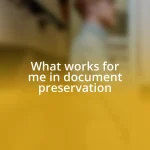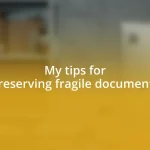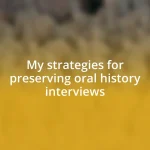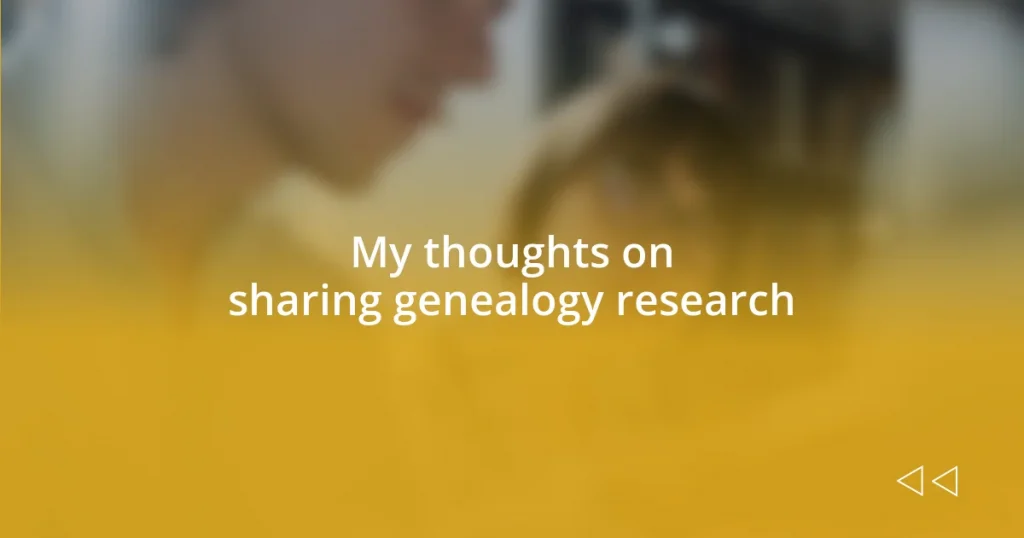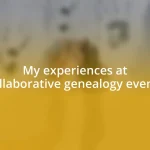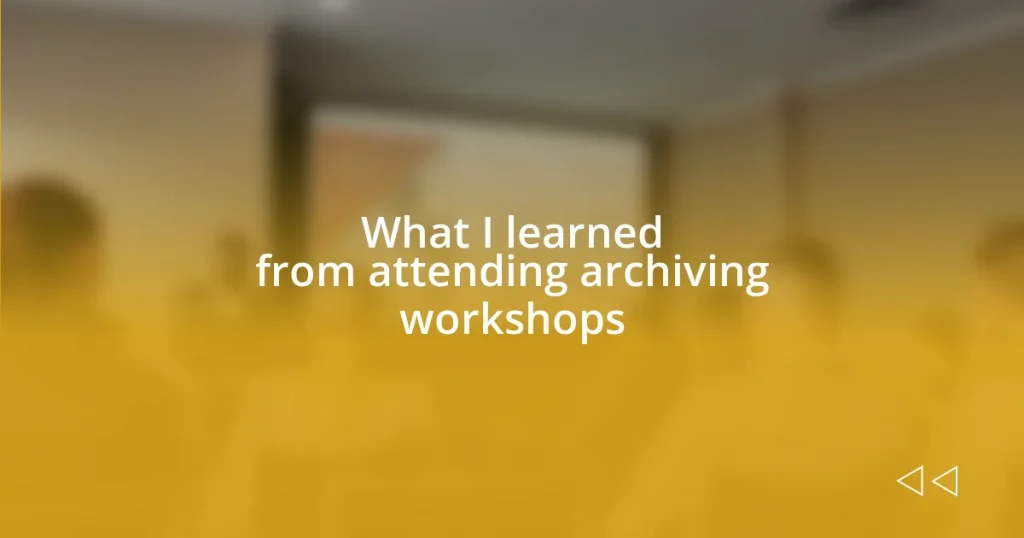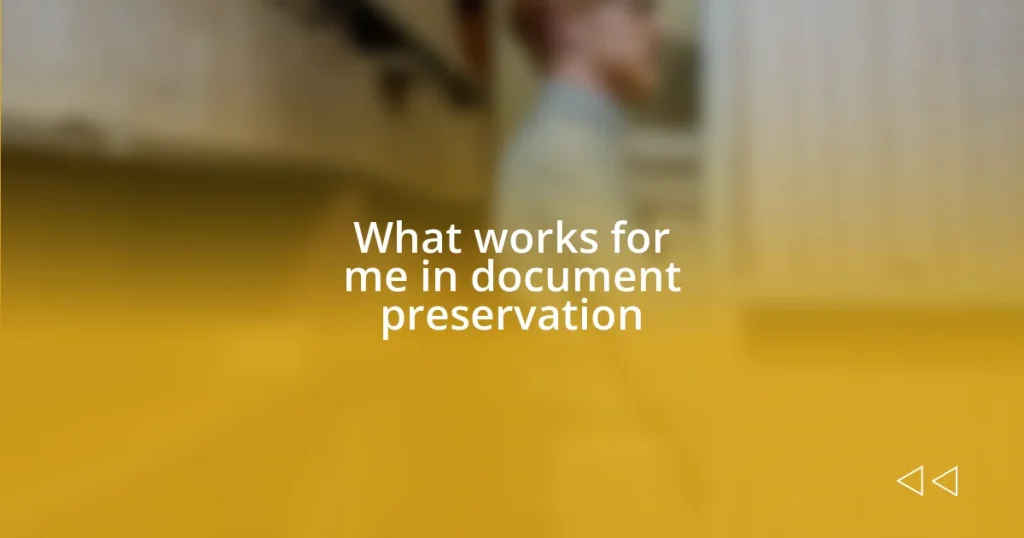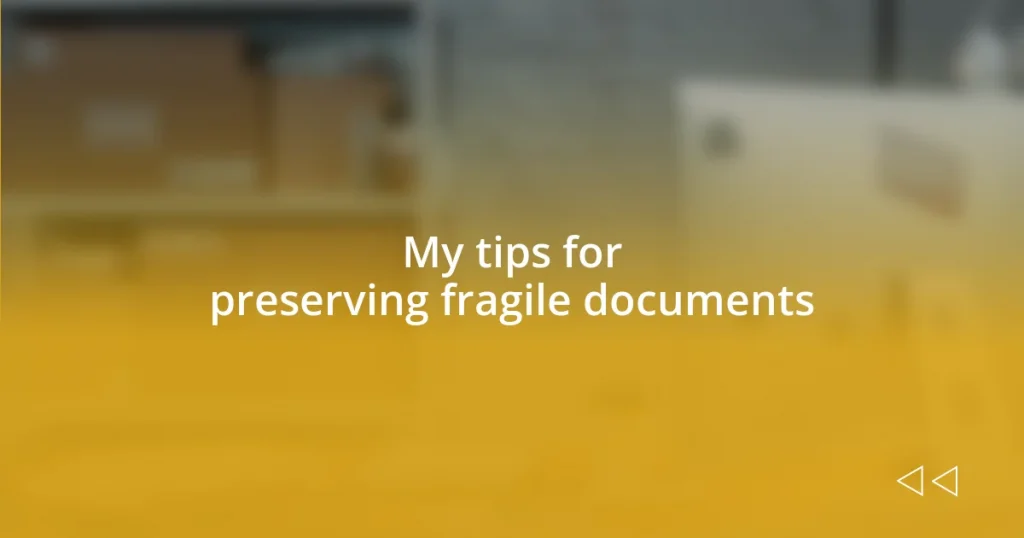Key takeaways:
- Genealogy research strengthens family bonds and provides a deeper understanding of personal and historical contexts.
- Building trust in sharing findings involves transparency, open feedback, and collaboration with other researchers.
- Protecting personal information is crucial; always seek consent and anonymize sensitive details when sharing genealogy research.

Understanding genealogy research benefits
One of the most rewarding aspects of genealogy research is the profound connection it fosters with our past. When I stumbled upon an old photograph of my great-grandparents, I felt an overwhelming sense of belonging; it was like a piece of my identity was finally revealed. Isn’t it fascinating how digging into our ancestry can evoke such deep emotions and make us feel closer to our roots?
The benefits of this research extend beyond personal insights. It can actually strengthen family bonds, as I experienced when I shared my findings with relatives. We spent hours reminiscing and sharing stories, laughter echoing through the room. Have you ever thought about how your research could spark similar conversations within your family?
Furthermore, understanding genealogy research helps us appreciate the historical context of our ancestors’ lives. I remember learning about the struggles my great-grandfather faced during the Great Depression—it gave me a new perspective on resilience and hard work. How often do we consider how our family histories can shape our values and perspectives today?

Building trust in genealogy sharing
Building trust in genealogy sharing is essential for creating meaningful connections between researchers. When I first decided to share my findings with a distant cousin I had found through Ancestry, I was nervous. However, our mutual interest in our family history quickly laid a foundation of trust, allowing us to exchange information freely and openly. It’s amazing how a shared passion can transform strangers into collaborators.
I’ve learned that transparency in sharing sources and methods enhances trust significantly. For instance, I always cite where I found my information, which not only validates my research but also invites collaborative verification. This approach not only strengthens my credibility but also fosters a sense of partnership. Have you ever considered how sharing your research methods can invite others to engage with your work?
Additionally, building trust also involves being receptive to feedback. Initially, I felt defensive when receiving corrections, thinking of it as a personal attack. But I’ve come to understand that constructive criticism can enhance the quality of my research. By embracing this mindset, I’ve made valuable connections and strengthened my ability to contribute to a larger genealogy community.
| Trust-Building Strategies | Benefits |
|---|---|
| Transparency in sources | Increases credibility |
| Open feedback attitude | Enhances collaboration |
| Shared goals and interests | Strengthens connections |

Ethical considerations in sharing research
When considering ethical implications in sharing genealogy research, the importance of privacy cannot be overstated. I once shared a branch of my family tree that included living relatives. After a heartfelt exchange, one of those relatives expressed discomfort at being included, which made me pause and reflect on how sharing can sometimes overlook personal boundaries. Each individual deserves respect regarding what they wish to share about themselves, and I’ve learned to be more cautious about how information is distributed, especially concerning living descendants.
Here are some key ethical considerations to keep in mind:
- Permission: Always seek consent before sharing personal information about living relatives.
- Sensitive information: Be wary of sharing details that could be harmful or invasive, such as health issues or controversial family histories.
- Attribution: Acknowledge and respect the contributions of others in your research to honor their hard work and commitment.
- Data protection: Utilize secure methods for sharing documents and information to protect sensitive data.
- Cultural sensitivity: Recognize that different cultures have varying beliefs and practices around sharing family histories; approach with awareness and respect.
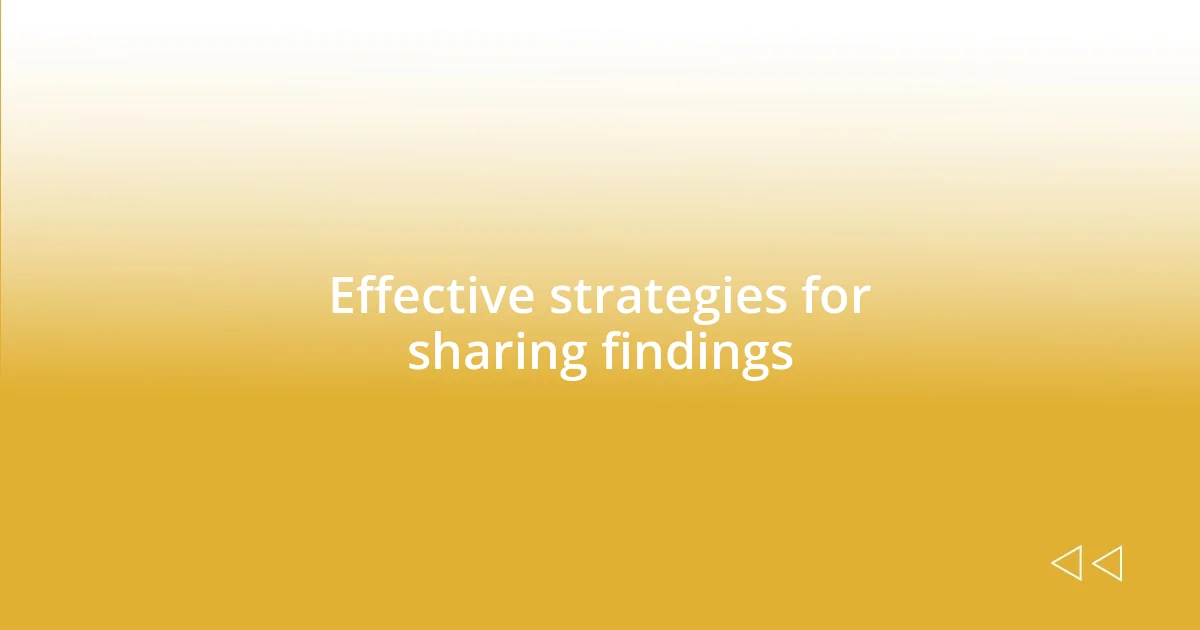
Effective strategies for sharing findings
When it comes to sharing findings, I find that organizing my research in a clear, visual way can be incredibly effective. The first time I used a chart to illustrate my genealogy discoveries, I noticed how much easier it was for my relatives to grasp the connections among our ancestors. Have you ever experienced that “lightbulb moment” when a complex idea suddenly feels simple? Utilizing timelines and diagrams can make the stories behind our family trees accessible and engaging.
Another strategy involves using digital platforms to create an online presence for my research. Recently, I started a blog where I share tidbits about our genealogy journey along with photos and stories. It’s not just about presenting facts; I want to invite others into the narrative. I often find that readers appreciate snippets of personal anecdotes from my journey just as much as the facts themselves. This fosters a more intimate connection—something akin to sharing coffee with a friend as you reminisce about family stories.
Lastly, engaging with social media groups dedicated to genealogy has proven invaluable. I remember the first time I posted a query about a brick wall in my research. The response was overwhelming; fellow enthusiasts shared their insights, suggesting resources I hadn’t considered. The collaborative spirit in these communities instantly made our shared passion feel more buoyant. Have you thought about how a simple post can lead to unexpected connections and support from others who are just as passionate about family history?

Collaborating with other researchers
Collaborating with other researchers has been a game changer in my genealogy journey. I remember a time when I was stuck on a particular family line, feeling like I’d hit a wall. Then, a fellow researcher reached out to me through a genealogy forum. We decided to combine our notes and insights, and what a revelation that was! Sharing ideas and resources not only brought new information to light but also rekindled my excitement about digging deeper into our shared ancestry. Have you ever experienced that sense of community that makes the often solitary task of research more enjoyable?
I also find that collaborating can spark new perspectives on our findings. I once partnered with a researcher in another state who had access to databases I hadn’t explored. When we pooled our resources, it was like uncovering treasure! I realized how vital it is to keep an open mind; I had focused narrowly on one branch of my family tree while they encouraged me to broaden my search. These fresh insights propelled my research forward in ways I hadn’t anticipated. Isn’t it fascinating how a single conversation can broaden your horizons?
Lastly, there’s something beautiful about the friendships that form through these collaborations. Long after our research partnership ended, I still keep in touch with that researcher. We share updates about our discoveries and even some family-related anecdotes. Each exchange serves as a reminder that genealogy isn’t just about names and dates; it’s also about building bonds with others who share this passion. Have you found that collaboration can turn a solitary pursuit into a shared adventure?
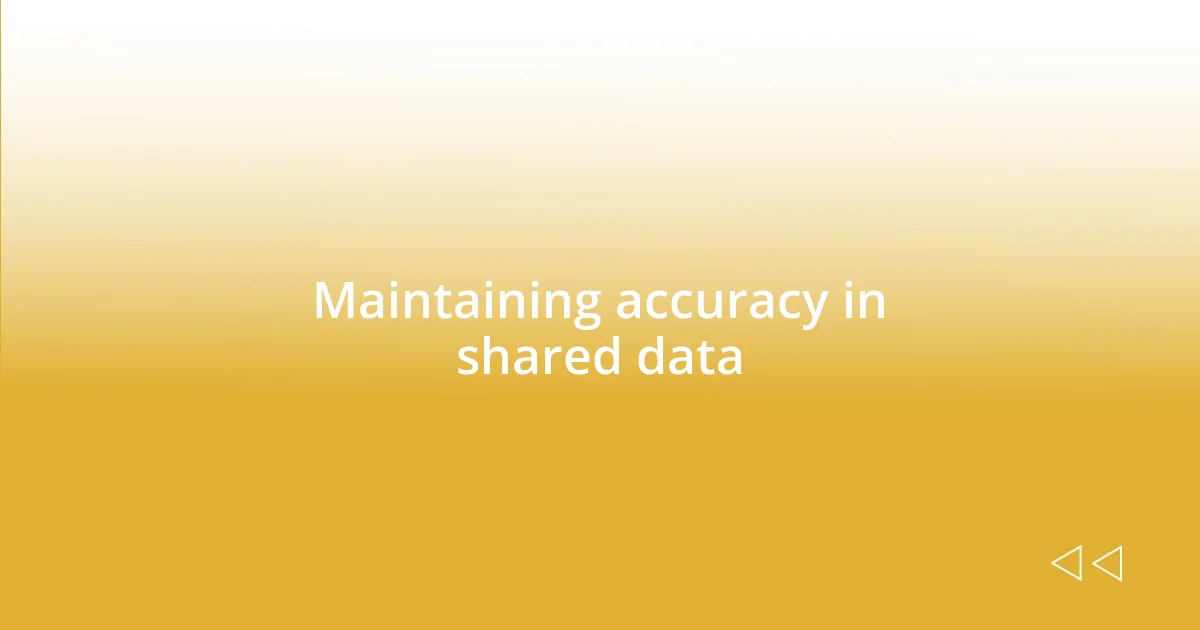
Maintaining accuracy in shared data
Maintaining accuracy in shared data is a crucial aspect of genealogy that I can’t emphasize enough. Just the other week, I came across a family tree someone had published online that contained several inaccuracies about my great-grandfather’s siblings. It struck me deeply, as I know how these errors can propagate and mislead others. I often ask myself, how can we foster a culture of accuracy within our genealogy circles?
To ensure accuracy, I’ve made it a habit to meticulously verify facts from multiple credible sources before sharing anything. There was a time when I shared a story about an ancestor that turned out to be based on hearsay. That experience taught me the importance of double-checking my sources, whether they be historical documents, census records, or birth certificates. The thrill of sharing correct and verified information is unparalleled, don’t you think?
Another strategy I find helpful is encouraging feedback from my peers. For example, after sharing a branch of my family tree on a genealogy forum, I invited others to review it for any discrepancies. The insights I got were eye-opening, revealing both minor errors and new connections I hadn’t noticed before. It’s heartwarming to see how a community can help refine each other’s work. Isn’t it reassuring to know that accuracy isn’t just a solo endeavor but a shared responsibility?
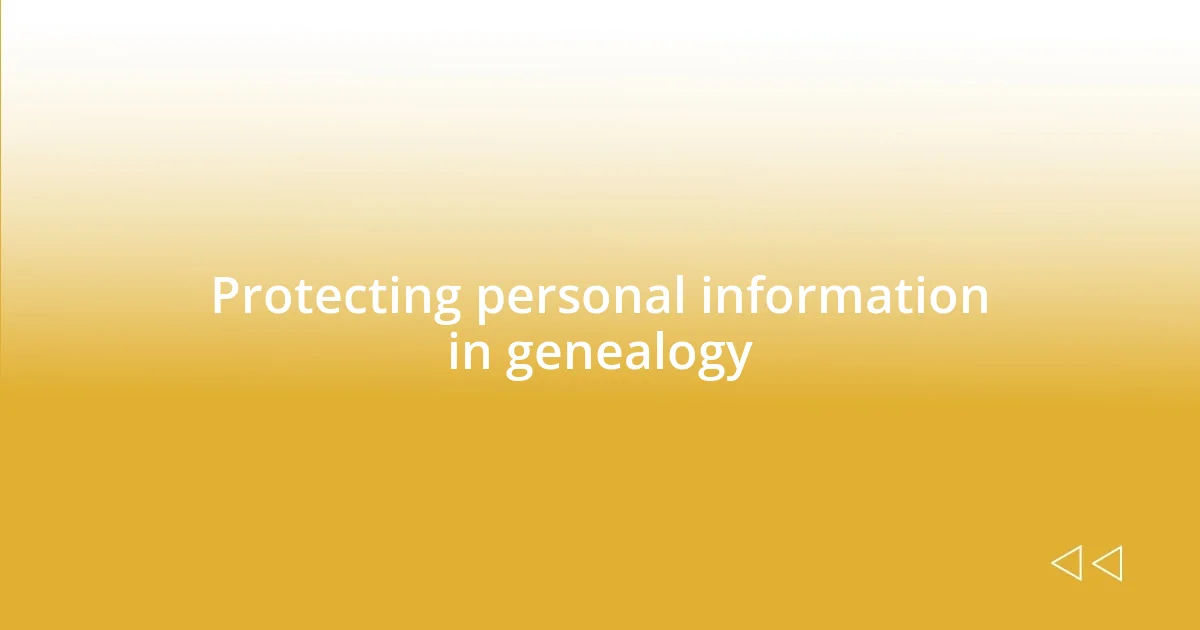
Protecting personal information in genealogy
When it comes to sharing genealogy findings, protecting personal information is non-negotiable. I once shared a branch of my family tree that included living relatives, only to realize later that I had unintentionally exposed sensitive information. The thought of my family’s data being vulnerable hit me hard. I learned that it’s essential to respect privacy, especially for living individuals, and this has shaped how I approach sharing my research.
I regularly take steps to anonymize data before sharing it publicly. For example, I remove details such as addresses or contact information when discussing more recent ancestors. I even go a step further by using initials instead of full names when necessary. It’s a simple practice, but it significantly reduces the risk of unintended consequences. Have you ever considered how easy it is to overlook the impact of sharing too much information?
With this focus on privacy, I also encourage others in the genealogy community to initiate conversations around personal data protection. I remember a stimulating discussion I had at a local genealogy group meeting, where we all shared strategies for safeguarding sensitive information. This collective insight was not just beneficial; it was a revelation. Understanding how we can collaboratively protect each other’s information makes us stronger as a community. Isn’t it empowering to know that we can be cautious while still celebrating our shared heritage?

